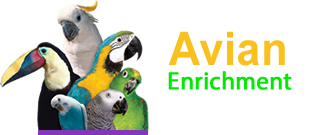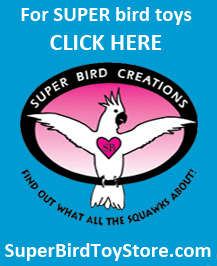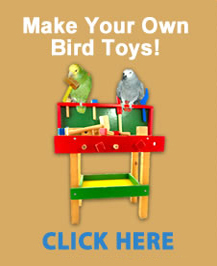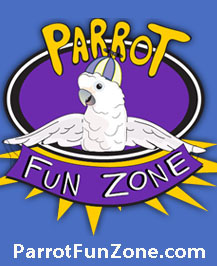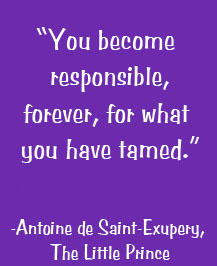What's the Point?
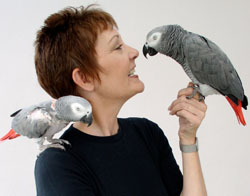 Having a parrot in your life is a puzzling existence. I suppose you could agree with the idea that they provide companionship just as a dog or a cat does, but why in God’s name a parrot? Where did we ever get the idea that having a parrot would be a life enriching experience?
Having a parrot in your life is a puzzling existence. I suppose you could agree with the idea that they provide companionship just as a dog or a cat does, but why in God’s name a parrot? Where did we ever get the idea that having a parrot would be a life enriching experience?
They’re loud, messy, demanding, pushy, selfish, self-absorbed, and whiney. Amazing isn’t it? We could have opted for the alpha-male position by having a dog. But Noooo! That would be too easy. We could have not bothered with any of it and found a cat in good need of a hearth and home. You know, A little fuzzy guy that wouldn’t be too much trouble and really didn’t care if we lived or died as long as the food train rolled around twice a day.
Oh no. We’re not having any of that. We had to go out and pay a big load of bucks for creatures that want our love, our undying attention, our free time, our not-so-free time, and our retirement fund just to keep them in toys, food, entertainment and a decent cage.
If they get upset, they scream, bite, or throw a hissy fit. They can develop behavior problems at the drop of hat, a towel, or anything else. They’re touchy, moody, needy, and sensitive.
They will play you like a violin, and strum on your heartstrings just to get that extra 10 minutes with you after you declared it was time for bed. They will sulk, talk under their breath, and work you to death to get what they want. They want something wonderful and they want it now!
On the surface, having a parrot as a companion sounds so neat. It’s exotic and different, but it doesn’t quite put you in the same exotic ballpark as the people who would like to introduce you to their Tarantula. That would be just a bit much for even your most seasoned average pet owner. Owning a bird, especially a big bird, is socially acceptable, and has become more prevalent. However, it’s still downright unconventional…it sets the person apart from the norm, but it’s not too eccentric. It tends to define who the perspective owner perceives himself to be.
So many misunderstandings and so many misconceptions about the practice of companion bird care are still rampant among the general public and it’s starting to make me wonder when we’ll all get it right. It wouldn’t bother me so much if parrot keeping weren’t on such an upswing in popularity. I’m not saying that having a parrot should be some exclusive little club where only those deemed “deserving” should be allowed to have birds. What I’m trying to express here is that sometimes the challenge of these creatures is too much for too many people.
I don’t believe the general public understands what is involved in having a companion bird. All parrot companions get the same statements and comments from people as to why they would love to have a parrot. Usually they want one just like mine, and I tell them that Parker is the result of thousands of hours of research, training and attention. Parker really isn’t an accident, and a lot of how he behaves, which is what makes him so endearing to people, is a result of all of this work. I have to explain to them that parrots don’t just show up on your doorstep and behave the way he does.
Parker isn’t particularly special or even that talented. He’s your run-of-the-mill African Grey. He looks like every other African Grey. He’s a parrot. He’s pretty good at it, this “being a parrot” business, but that’s what he’s made to be and to do. I don’t believe he thinks he’s a human. He’s really an enjoyable little guy, and quite fun to have around. He’s quite social, and doesn’t do anything terribly obnoxious. So far he doesn’t have any problems. It’s still early but I’m hoping it will all turn out well.
But many people simply state the following, and this is usually what I’m thinking:
“I’m different, I don’t follow the norm.” (I don’t either, but I didn’t drag a parrot into the equation until I knew I could handle it.)
“I know I can handle the responsibility.” (Oh, really? I’d like to introduce a few birds to you. Say hi to Chopper, Chainsaw, and Drill Bit!)
“They’re so cute!” (You betcha! Say hi to Chopper’s beak.)
“They not big animals and they don’t take much time to maintain.” (This is a lovely poop machine especially designed to redesign your beautiful Berber carpet with an exotic Dalmatian pattern. Keep them clean, train them, teach them, and feed them well or you will most likely end up living in a constant mess and with a sick or psychotic parrot.)
“You can leave them alone in their cage for a few days can’t you?” (Sure! Just pop your kids in there with him. You were going to leave them too, weren’t you? )
“What do they eat?” (Did you ask this question when you decided to have children? If you’re asking, you haven’t done your homework.)
I end up spending more time talking people out of getting a parrot rather than the opposite. And the people who I think would make wonderful parrot companions are quite hesitant because they’re the ones who know what a vast undertaking it is and they doubt their own ability to take on such a big responsibility. These are the people that are thinking long and hard about the task. It’s the confident ones I worry about. These are the people that will obtain a parrot and think that all they have to do is feed it and clean it and it will sit there and learn all on its own.
I had a talk with a gentleman acquaintance that had a 9-month-old baby girl, and he stated that he wanted to get a parrot for his daughter. I asked him why. His response was chilling. He said, “I can afford it. And I want it for my daughter. You know, a nice “toy” for her to play with.”
I kept my cool, and asked him if he thought his daughter was a lot of work. He agreed that she was a load of work, and that it was more than a full time job. I then asked him if he was planning on having any more in the near future. He told me no, he and his girlfriend weren’t going to have any more kids because they hadn’t exactly planned their daughter, and they just couldn’t handle any more.
I then politely proceeded to explain the work involved in raising a baby parrot: The time, the training, the diet requirements, the attention and the fully involved commitment. He was obviously stunned, and backed down from the thought. He got a little upset when I asked if he kept his daughter around because she was a nice “toy” for him and his girlfriend. But he got the point that I wasn’t too thrilled with his “toy” comment and we left it at that.
I have a theory. Unlike human beings, I don’t believe that anything a parrot does is entirely unreasonable because I don’t think a parrot can be deliberately deceptive with one exception: they will hide illness. I believe any unreasonable behavior is a direct result of a situation they cannot cope with. This response stems from a combination of their environment, and DNA. Their responses to stress are about as varied and different as how people respond to stress. I think they will respond to the same stressful situations just as people do. Not everyone will respond to the same situation in the same way. Millions of people fly on airplanes every day. Some people won’t even go near an airport. It all depends on how you’re wired, what your conditioning has been, and what your level of comfort or stress is.
It’s the same way with parrots. I think that when a well-looked after parrot displays a negative behavior it is most likely a result of something that has changed, something that he doesn’t understand or fears, or it stems from a physical condition, such as sexual maturity, illness or pain. They want what they want, and like children, they don’t understand why they can’t always have their way. To paraphrase psychiatrist, R.D. Laing: “Madness is a sane response to an insane situation.” Everything about this “living with people” lifestyle goes against their nature. It’s not a bad life for most parrots and they usually adjust to it so beautifully. But every once in a while, instinct raises its head and we have to somehow work out a solution that is workable for both parties.
Push them too far and they’ll push back and bite you. Push them further still and they will pluck, scream or self-mutilate. They will push back so far and so hard that they sometimes end up getting pushed out of a lot of homes.
But when it works, it is beautiful. God, they love you. Not only do they love you, they can actually tell you that they love you. This is where the beauty, the balance and the gripping artistry take hold of our hearts.
There is absolutely nothing like having a parrot sitting in your lap: this wild animal who accepts you as a flock member, and a friend. It is a cross-species relationship that transcends the natural order of things. I think the fascination comes with the closeness of the relationship despite what nature normally dictates. It bucks what is considered “natural”. There is indeed a poetry and symmetry to this unnatural state, almost as if there were perfect balance required to maintain the relationship on a very long teeter-totter. But the balance has to be maintained or someone hits the dirt. A respect on both sides must be instituted or someone ends up crossing that line of balance, and it is a very thin line. You must give parrots credit. We never bother to learn their language. We force them to learn ours in order to communicate, and they are sometimes not considered to be cooperative or intelligent unless they learn our ways of communication. At best, we can follow some very rudimentary physical cues. Tail wagging; eye-pinning, preening, foot stomping and beak banging are about all we can follow. My, this is incredibly intuitive of us!
In the meantime, they are calling us by our names, asking for dinner, singing like Streisand, telling the dog to be quiet and attempting to answer the phone.
I love having a companion parrot. I love who Parker is and I have changed profoundly for the better as a result of our relationship. He didn’t have to change a thing other than learn a few simple rules about manners. He just goes on being a parrot and I am lucky enough to have earned his trust. My relationship with Parker has not only changed the way I look at the world, but how I feel about it. This still wild little creature has the ability to teach me so much just by waking up in the morning.
Unlike dogs and cats, birds have not yet domesticated themselves. They still have no need to and we certainly haven’t spent enough time in a companion environment to change their wiring. We chose to take on this relationship because we need them, not the other way around and I think we need to live up to it. By failing them, we fail ourselves. And that would leave us with having to admit that we were not worthy of the relationship in the first place.
